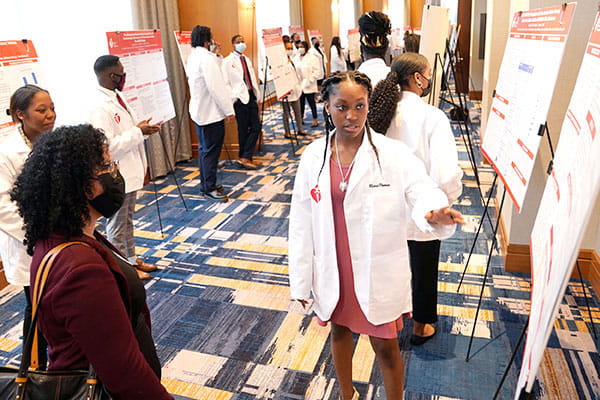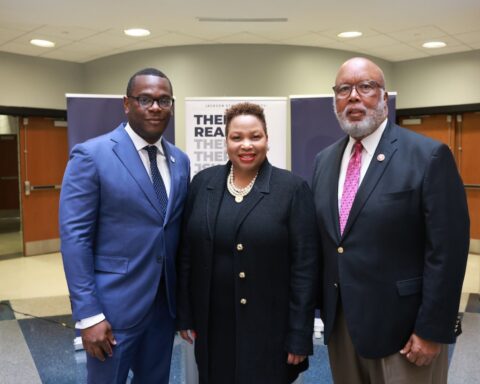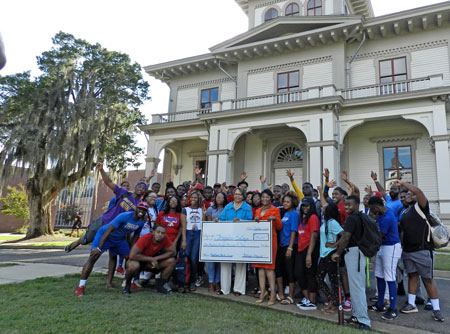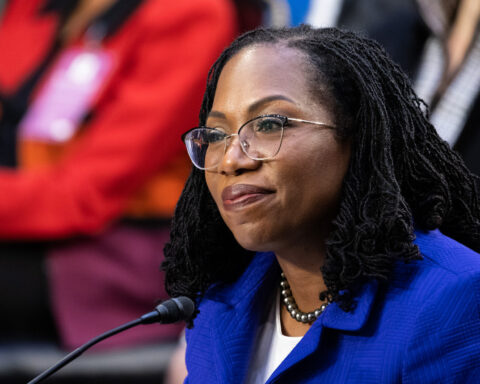Courtesy of Morehouse School of Medicine
The American Heart Association’s program has the goal of increasing the number of Black students who apply and are accepted into medical schools.
One of its newest participants, Jada Hall from Gulfport, is a junior chemistry major at Tougaloo College in Jackson. She is studying to become a pharmacist
“What makes me interested in pharmacy, in medicine, in all of those things is I’ve just always been kind of keen on the sciences and very much with chemistry and how different metabolic ways in the body just interact with each other,” Hall said. “Medicine in pharmacology is just very interesting, seeing how they interact, but not only just the science behind it, the impact. Being able to go out into communities as a potential pharmacist and serve those who have different health problems or issues and just seeing them improve overall.”
Hall is researching preeclampsia through a lab at the University of Mississippi Medical Center as a part of her work with the scholars program.
“From what I understand, is that preeclampsia has higher rates in women of color, specifically Black women,” she said. “To be a part of a research project that’s looking at how cardiovascular disease can be related to preeclampsia and how we can discover potential medicines that can treat it and just being a Black woman, it means a lot.”
Hall says the program has allowed her to network with other students and healthcare professionals.
“Not only that, it has also shown me different pathways I can take,” she said.
The program not only supports students in their research projects, it also pays for travel, lodging, and provides a stipend for different events held around the country.
“Their mission is to make sure underrepresented students like I are able to have the opportunity to be in fields of health care, in fields of biomedicine,” Hall said. “That was definitely something that inspired me.”
Black residents make up more than 37% of Mississippi’s population. However, out of 5,688 doctors, less than 600 of them are Black, according to the Mississippi State Board of Medical Licensure.
“It’s highly important to make sure that you have proper representation for better health outcomes because you want to make sure that you’re able to treat all people, not just one group,” Hall said.
Dr. Demondes Haynes is the associate dean for medical school admissions for the School of Medicine at the University of Mississippi Medical Center.
“I did not meet a Black doctor until I came to medical school, and I’m a native Mississippian,” he said. “I grew up in Louisville, Mississippi. I went to school at the University of Mississippi, but I did not meet my first Black doctor until I was in medical school. The good news now is I know we have students who are getting to meet Black doctors all over the state. We have more. It’s still not enough, but we definitely have more than when I was a student here many years ago.”
Dr. Haynes says while he believes it’s important for patients to have choice in their physicians, he doesn’t believe every Black patient has to have a Black doctor.
“There is great data that shows that patients tend to have better health outcomes when they see someone who they identify with, whether that is in terms of race or gender or ethnicity,” he said. “When a patient is seeing a doctor that understands where they’re coming from, that understands everything that’s contributed to who they are, I believe they’re more likely to be adherent to recommended therapies. I think they’re more likely to be open to frank and honest discussions if they don’t want to try medication or therapy.”
The University of Mississippi Medical Center’s School of Medicine currently offers different visitation days that are open to potential students of all races, but aims to attract Black, Hispanic and Native Americans.
“[There is] sometimes a misconceived notion that they come here and they get some secrets and they get in easily,” Dr. Haynes said. “It’s all about exposure. We bring them here and they meet medical students and they meet black doctors and they see what it’s like in our simulation lab, we talk about the curriculum and we talk about what’s needed to be successful in applying to medical school.”





